FGT think your best choice in the future
System Integration Designers in FGT
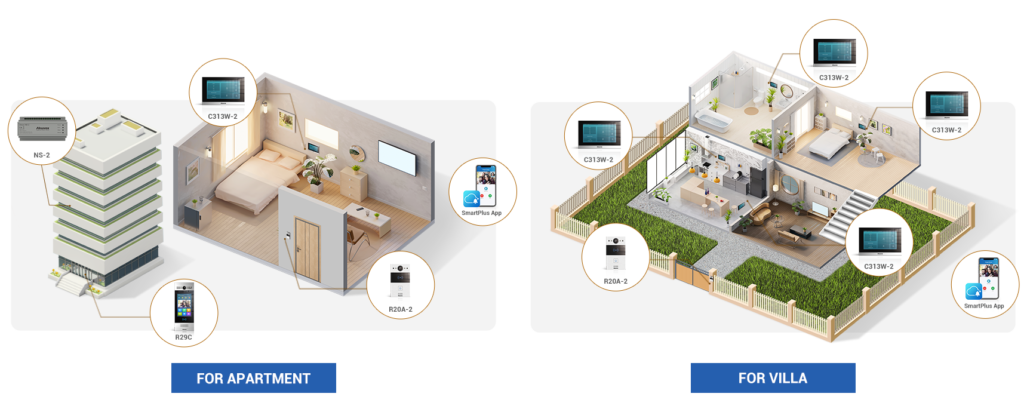
- 2023-02-27
- 1:13 pm
10 Best Video Intercom Systems for Apartment Buildings in 2022
We've reviewed the best video intercom systems for apartment complexes or condominium complexes to help you choose the right one in 2022
Below is our list of the top 10 international manufacturers:
- Akuvox
- Aiphone
- DoorKing
- DoorBird
- 2N
- Control4
- Hometek
- KCA
- TECOM
- FLH
Introduce
Whether you're installing a walkie-talkie in a new development or retrofitting a system in an existing apartment complex, you need to choose a system that meets the needs of you and your residents. But there are so many video video intercoms on the market, how should you choose the right intercom? We created this all-in-one guide to choosing the best condo video intercom system for your building.
This guide covers:
- What is a video intercom system?
- How do video intercoms in apartment buildings or condominium buildings work?
- Types of video intercom systems for apartment buildings or complex housing buildings
- The benefits of video intercom systems in apartment buildings or condominium buildings
- 5 Questions to Ask Before Choosing a Video Intercom System
- Reviews and Comparisons of the Best Video Intercom Systems in 2022
What is a video intercom system?
A video intercom system is a modern type of building entrance system that includes a camera. When a visitor requests access to the property, the walkie-talkie sends video and audio clips to the occupants. This way, occupants can visually confirm who is requesting access before opening a door or gate. The apartment's video intercom also enables residents to open doors for visitors via in-room intercom hardware or smartphones.
Multi-tenant video intercom systems provide one-way or two-way video calls. One-way video recording only allows occupants to see visitors at the entrance, visitors cannot see occupants. Two-way video allows residents and visitors to see each other.
Video intercom system with access control
One of the most important aspects of VIP intercom in an apartment building or condominium building is the door opening mechanism. This mechanism allows occupants to remotely unlock doors for their visitors.
There are two types of door locking mechanisms in apartment video intercom systems with door releases:
- Electronic locks
- Magnetic lock
Electronic locks
An electronic lock (or electric lock) is a mechanical device powered by electricity. You install it on the door frame and replace the strike plate.
The lock only receives power when it needs to unlock the door. At all other times, no current flows to the lock. To unlock the door with an electric shock, you must provide power.
When the resident opens the door through a smartphone or the hardware of the indoor intercom in the unit, the visual signal affects the intercom system to supply power to the electronic lock, so that the latch of the lock is released and the door is opened.
Magnetic lock
Magnetic locks (maglocks) are magnetic devices that are also powered by electricity. Magnetic locks consist of a magnet and a metal plate. In most installations, it is aligned with the door frame, usually on top of the frame.
Magnetic locks require constant power to stay locked. When the door is locked, an electric current is passed through the magnet of the magnetic lock, creating an electric charge, which is attached to the magnetic plate to keep the door locked.
To unlock the door, the intercom signals the door release system to stop power to the magnetic lock. The door is then opened to allow entry of occupants, visitors or staff.
What is the cost of video intercom hardware and installation?
The price of a video intercom system for an apartment complex or complex can range from $1,000 to $7,000, depending on the type of system you have installed. However, this price includes video intercom hardware only and does not include installation, maintenance or ongoing service charges.
The cost of installing an intercom system in an apartment complex or condominium complex fluctuates the most and varies depending on your area. Installation costs will be higher if you choose a wired system. You may also need to budget for software costs and monthly service charges based on the number of units in your apartment building.
How does the video intercom system work in an apartment building or a condominium?
Video intercom in an apartment building or condominium building typically works by establishing a video call between the intercom hardware at the entrance and a device controlled by the building's occupants. Tenants can then use their devices to unlock doors or gates for visitors.
The working principle of multi-tenant video intercom:
- Visitors request access using the video intercom (gate phone) at the entrance.Visitors search the intercom directory for the resident they are visiting. Once they find the resident's name, they press the appropriate button to call them.
- The door machine notifies the residents through the cloud host.Residents then answer the call at the gate—whether it's an in-unit device or their smartphone. Modern video intercoms come with a mobile app that notifies occupants when there is a visitor.
- The resident grants access to the cloud host of his VTO.When the resident presses the button to allow access, it signals the gate operator to release the electric lock mechanism to open the door.
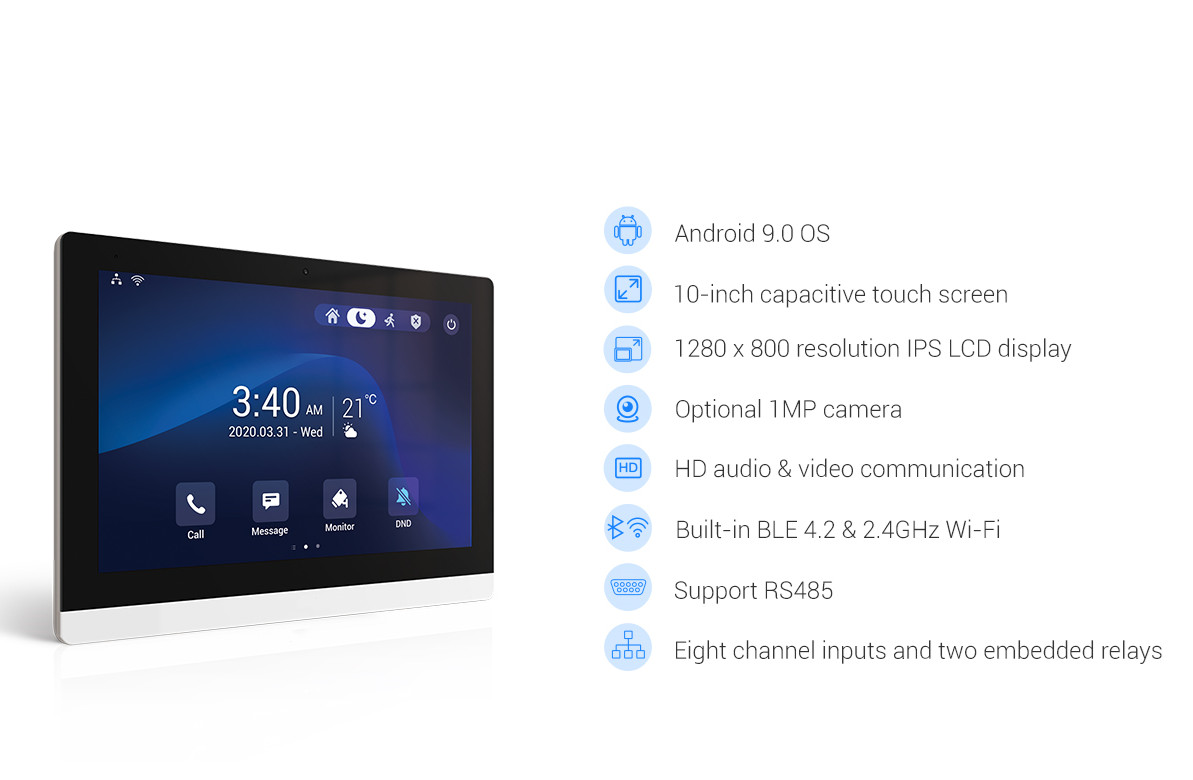
Types of video intercom systems for apartment buildings or multi-housing buildings
Today, there are a wide variety of apartment video intercoms on the market. But keep in mind that not all video intercom systems are created equal. Before choosing a walkie-talkie for your multifamily or condominium complex, you must consider the property's infrastructure, the needs of the occupants, and your budget.
The four main types of video intercoms for apartment buildings or condominium buildings are:
- wirelessVideo image intercom system
- Cloud based intercom system
- IP video and video intercomsystem
- Video intercom with mobile appsystem
1. Wireless video intercom system
When choosing a visual image intercom system, weak current engineering wiring is an important consideration.
Video intercom can be wired or wireless. Wired systems require wiring from outdoor equipment to indoor intercom equipment within each unit. In contrast, wireless video intercom systems do not require wiring between outdoor and indoor devices.
Generally speaking, wired walkie-talkies are more difficult and costly to install. Wireless intercom systems for buildings offer a less complicated (and therefore more affordable) installation process.
2. Cloud-based intercom system
Cloud-based video intercom enables you to manage your system remotely without having to travel to the site. Video intercom with cloud-based software allows you to update your home directory listing and manage permissions from anywhere, on any device. The cloud-based system also enables residents to open doors for visitors from anywhere - even if they are on the other side of the world.
3. IP video and video intercom system
IP video intercom is any apartment entrance system that uses camera lenses and IoT connectivity. "IP" stands for Internet of Things Protocol, a set of routing and addressing rules used to transfer data over a network to the correct destination.
IP video intercoms work by transmitting video and audio data between the gate units used by visitors and the indoor intercoms used by residents. Residents unlock the door remotely using an intranet-connected device in the apartment building itself.
4. Mobile APP visual video intercom system
Many apartment buildings or condominium building video intercom systems have mobile applications that provide remote property management access. So residents can open and manage doors even when they are not on site. Residents of apartment complexes or condominium complexes can also use the mobile app to remotely answer video calls and grant access.
Given the extent to which smartphones have simplified and improved the lives of millions, allowing mobile devices to open doors will significantly improve the resident experience.
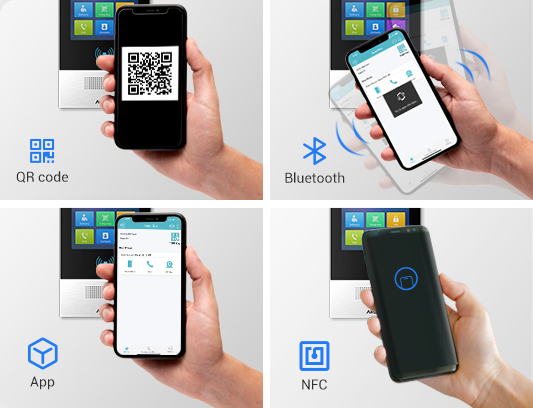
The benefits of video intercom systems in apartment buildings or condominium buildings
Video intercoms offer several advantages over audio-only systems when installing or replacing intercoms in your apartment complex or complex. Many older models of walkie-talkies, such as telephone entry systems, lack the convenience and added security of using a video-based walkie-talkie.
Here are some benefits of an apartment video intercom:
- Improve security:Residents and building staff can see who they have asked to identify visitors before granting access. In addition, the risk of property damage is low. Potential saboteurs are less likely to take action if they feel like they're being watched by a walkie-talkie camera.
- Remote access:Through smart video intercom, staff and residents can grant visitors, couriers and service providers access to the building even when they are not at home. Administrators can also edit permissions remotely from the cloud-based platform.
- Audit Trail: Every time someone enters the property, the walkie-talkie records a time-stamped and date-stamped photo that can be viewed by building staff at any time.
- Express delivery management:With the growing popularity of online shopping, package theft has become a serious problem in recent years. Many residents of apartment complexes or condominium complexes complain of lost or stolen packages, and even plan their schedules to receive couriers at home. With video intercom, residents can buzz among deliverymen from anywhere.
5 Questions to Ask Before Choosing a Video Intercom System for an Apartment Building or Housing Building
- Do you want one-way or two-way video?
- Do you want to install in-unit intercom hardware?
- How many residential units are there?
- Do you want to manage the system remotely?
- Is granting remote property access a priority?
- Do you want one-way or two-way video?
Some video intercoms offer one-way video calls where tenants can see visitors, but visitors cannot see occupants. Others offer two-way video calls so tenants and visitors can see each other. Two-way video requires the tenant's assistive device, such as an in-unit device or the tenant's own smartphone.
- Do you want to install in-unit intercom hardware?
An intercom system requires two components: a gate station at the entrance for visitors, and an interior intercom for residents. Advances in technology have made it possible to replace in-unit intercom hardware with a device that most residents already have in their pockets: a smartphone.
The Smart Video Video Intercom System enables occupants to use the intercom system via a smartphone, eliminating the need for in-unit intercom hardware. Instead of relying on intercom devices installed in every unit of the building, residents can use their smartphones to open and manage doors, creating a more seamless and convenient experience.
Two benefits of smartphone-based video intercom systems are:
- cut costs:Using a smartphone-based apartment entry system eliminates the need to wire and install hardware in each tenant's apartment unit. The cost of purchasing and installing the necessary wiring and hardware increases rapidly, so smart video intercoms are more cost-effective for most properties.
- Convenience:With smartphone-based video intercoms, residents can open doors for visitors, deliverymen and service providers, no matter where they are – at their unit, at the gym or out for a dog walk. Residents also don’t have to worry about carrying keys or keys with them, as they can unlock the door with just their smartphone.
- How many residential units are there?
Think about who will use your video camera every day and what they need. Some video intercom systems limit the number of apartment complexes they can support, while others limit the number of residents per apartment.
So make sure any system you choose is reliable and can handle your property's traffic. The last thing any homeowner wants is to be locked out because the access system is overwhelmed.
- Do you want to manage the system remotely?
With many older building entry systems, you must be on-site to update the resident directory listing or manage permissions. Not only is this an inefficient use of time, but these field services cost a lot of money and take up a lot of space.
If you want to control access and manage your system from anywhere, choose a smartphone-based video camera with cloud software.
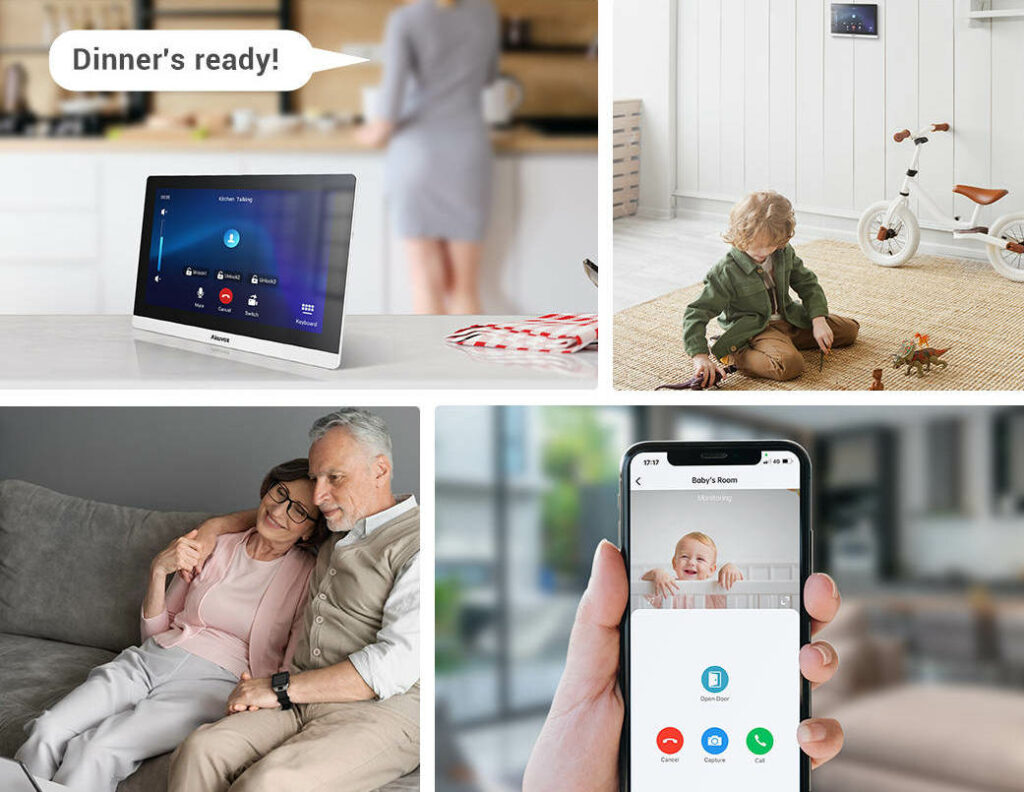
- Is granting remote property access a priority?
Some video intercoms allow residents and staff to open doors or gates when they are not on the property. Consider whether this is an important feature of your building.
Remember the many benefits of granting remote access. Even small HOA mansions receive a flood of package deliveries and visitors who need temporary access to the building. With remote access, your video intercom system enables employees and residents to let people in from anywhere. Not only is this more convenient, but it also prevents package theft and ensures you see video footage of who is entering the door.
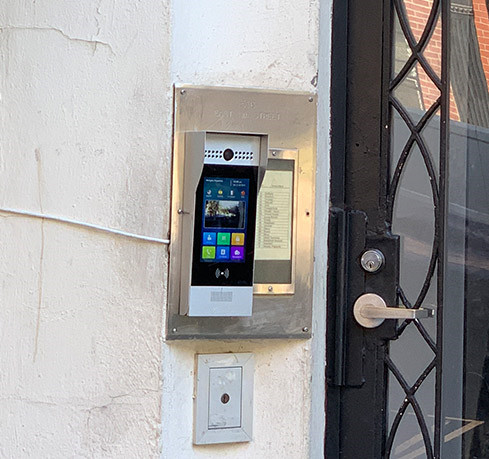
What is the best video intercom system for your apartment?
Once you've considered your budget, outlined your needs, and determined the intercom features that are most important to you, it's time to choose the right video intercom system for your apartment building.
There are a few options to choose from, but here is a list of the 10 best video intercom systems from major manufacturers:
- Akuvox
- Aiphone
- DoorKing
- DoorBird
- 2N
- Control4
- Hometek
- KCA
- TECOM
- FLH
- Akuvox Video Intercom System
Akuvox is a well-known player in the access control industry. Akuvox offers a wide range of radios - including smart radios - to provide technical solutions for buildings across multiple industries.
use application
- multifamily
- commercial
- Assisted Nursing and Hospitals
feature
- Options range from simple video doorbells and multi-button door phones to smart video intercoms
- Touchscreen and keyboard interface depending on model
- Facial recognition available on some models
- Temperature and mask detection on some models
- Weather resistant, built-in heater for cold climates
- Tamper-proof
- Flush or Surface Mount
Price
The exact price of the Akuvox walkie-talkies is unknown. Interested customers must contact for a personalized quote. However, with the approval of the ECC Yiqu team, the label can now consult the design team.
Advantages and disadvantages
advantage:
- Enable contactless input
- SmartPlus and Vfone mobile apps can be used with smart walkie-talkies
- Options for small and large buildings
- Support ECC together fun community management system
shortcoming:
- Most systems require in-room/in-unit hardware
- Indoor radios use Android or Linux operating systems
Read the full Akuvox SmartPlus Intercom review »
- Aiphone Video Intercom System
Aiphone bills itself as a brand of secure communication systems, offering a wide range of walkie-talkies for several security-focused industries.
use application
- one-parent family
- multifamily
- student dormitory
- commercial
- parking structure
- health care facility
feature
- Multiple product lines, multiple models, suitable for large and small buildings
- Video intercom option
- Provides touchscreen, handset and keyboard interface
Price
Aiphone radio pricing may not be available online as the company sells its products through distributors.
Advantages and disadvantages
advantage:
- Support for building complex/multi-building connections
- Offers modern video and touchscreen options
shortcoming:
- Not all systems are cloud-based
- Most models require built-in hardware
- Not all systems offer remote management
Read the full Aiphone IXG Series IP Multi-Tenant Video Intercom Review »
- Doorking Video Intercom System
A staple in the access control industry, Doorking (also known as DKS) offers a wide range of traditional telephone entry systems. DKS radios use regular phone lines to allow visitors to talk to tenants who can then remotely open doors or gates for their guests.
use application
- single family home
- Multifamily
- student dormitory
- commercial
- gated community
- Self-built warehousing
feature
- traditional telephone input system
- Some models are PC programmable
- Some mods have built-in directory listings
- Keyboard and call button interface
- Features sold separately, such as catalogues, lighting kits, and camera accessories
- Elevator control available on some models
Price
Doorking offers more than ten models of access control systems with different features and prices. According to the February 2020 pricing table, the walkie-talkie is priced from $1,300 to $6,450. Accessories are usually sold at an extra cost.
Advantages and disadvantages
advantage:
- durable
- Weather and tamper proof
- traditional design
shortcoming:
- May not have built-in camera/video intercom option
- May not offer cloud-based access management
- Cellular connectivity may require the purchase of a separate DKS cellular connectivity box
- Not all models are PC programmable
- May not have a mobile app
- No touch screen interface
Read the full Doorking 1837 phone entry system review »
- DoorBird Video Intercom System
Headquartered in Germany, DoorBird is a company in the field of IP intercom communications. DoorBird offers a wide range of intercom and access control products.
use application
- single family home
- multi-tenant building
- health care facility
- School
feature
- Keyboard and call button interface
- All models feature a wide-angle camera
- Simple, straightforward design
- Available in a variety of colors and finishes
Price
Door station hardware alone can range from about $400 (single-family video doorbell) to $2,500 (multi-tenant walkie-talkie). Accessories, enclosures and cloud services (for logging entry) are available for an additional fee.
Advantages and disadvantages
advantage:
- easy to install
- Open API for integration with third-party home automation and access control systems
- Mobile app for answering calls and granting remote access from your smartphone
shortcoming:
- Limited touchscreen models
- May only apply to multi-tenant buildings of up to 100 units
- Multifamily dwellings may lack cloud-based remote management
- may not be reliable
Read the full DoorBird D21DKH walkie-talkie review »
- 2N Video Intercom System
2N is a European access control company operating internationally since 1991. It offers a wide range of products including walkie-talkies and room answering devices, access control systems, elevator systems and IP audio systems.
use application
- commercial
- multifamily
- single family home
feature
- Touch screen or keyboard interface, depending on model
- 2N Remote Configuration and 2N Access Commander allow remote device management and management
- Optional operation of the radio with a smartphone or in-room answering machine
- Built-in Ethernet port
- Access options include Bluetooth, touchpad, RFID reader and fingerprint reader access options
Price
Many 2N radios are customizable, and the price depends on the accessories you choose. There is no exact pricing online, as 2N needs to be purchased through a distributor.
Advantages and disadvantages
advantage:
- Mobile app can be used to answer phone calls and video calls, and open doors from your smartphone
- Remote management and management capabilities
- Modular radios allow you to add specific features and customize your radio
shortcoming:
- 2N mobile app has limited user ratings for both Android and iOS versions
- Video resolution may be lower
readRead the full 2N IP Verso Intercom review »
- Control4 Video Intercom System
Founded in March 2003, Control4 is headquartered in Utah, USA. It is a well-known enterprise specializing in the research and development, production and sales of smart home products.
use application
- Villas/Single-Family Homes
- Apartment building
feature
- Two-way video call
- Mobile app for remote
- Zigbee wireless technology
- touch screen panel
- Ethernet based connection
Price
Pricing for each Control4 product isn't readily available, but the company's website says its commercial walkie-talkies start at $1,000.
Advantages and disadvantages
advantage:
- Video and audio call options
- Mobile app lets you open doors remotely
- The system provides photo logs of all access control, which are stored locally
shortcoming:
- Does not support multi-family door intercom
- No multilingual interface
- Control4 dedicated router required
Read the full Control4 walkie-talkie review »
- Hometek Video Intercom System
Hometek was established in 2001 and is headquartered in Taiwan. It is an enterprise engaged in the research and development, production and sales of building walkie-talkie products.
use application
- Residential
- Apartment building
feature
- analog video call
- With hardware button keys
- Physical wiring
- touch screen panel
Price
Pricing for each of Hometek's products can be found online, saying its commercial walkie-talkies start at $500.
Advantages and disadvantages
advantage:
- The most installed and used in Taiwan
- price transparency
- Focus on Taiwan
- analog transmission technology
shortcoming:
- No branch video and remote mobile application functions
- The traditional single-family security function, when an alarm occurs, cannot remotely monitor the operation
- Cannot support Onvif monitor camera function
Read the full Hometek HA-2048 walkie-talkie review »
- KCA Video Intercom System
KCA, a trademark established by Kaifeng Enterprise, is an early enterprise engaged in the research and development, production and sales of cross-field products of camera security into walkie-talkie hardware.
use application
- Residential
- Apartment building
- School access control monitoring
feature
- Two-way SIP video call
- No SIP server required
- With input and output contacts
- touch screen panel
Price
The price of each KCA product is not disclosed online, saying its Android version of the walkie-talkie starts at $700.
Advantages and disadvantages
advantage:
- SIP type can support IP cameras
- No SIP server required
- digital transmission technology
shortcoming:
- No wireless Zigbee capability
- Cannot support other brands of smart home hardware
- Only available in Taiwan market
Read the full KCA EH-3240 walkie-talkie review »
- TECOM Video Intercom System
Tecom is a Taiwanese company founded in 1978. It is a subsidiary of TECO and is a manufacturer of commercial communication equipment, including wired/wireless communication equipment and optical fiber communication equipment.
use application
- Residential
- Apartment building
- Commercial building
feature
- video call
- Support phone system
- With input and output contacts
- touch screen panel
Price
Prices for each TECOM product are available through regional resellers and start at $800.
Advantages and disadvantages
advantage:
- Supports IP cameras
- Support phone PXB system
- User Manual Public Support Download
shortcoming:
- No wireless Zigbee capability
- Cannot support other brands of smart home hardware
- Does not support artificial intelligence voice
Read the full TECOM T-7000 walkie-talkie review »
- FLH walkie-talkie
FLH, the agent of the high-end products of FIBARO, a leading Polish smart home company, is responsible for the sales and technical business in Taiwan for Fermi.
use application
- Residential
- Smart interior decoration
- hospital space
- meeting space
feature
- Detachable touch screen tablet
- Support lighting control
- Support electric curtain control
- Adopt Z-WAVE technology
Price
Pricing for each FLH product must be obtained through regional distributors, starting from undisclosed prices.
Advantages and disadvantages
advantage:
- Supports smart home hardware
- Support lighting control
- Support electric curtain control
shortcoming:
- Dedicated router connection required
- The setting function has no memory after disconnection
- Building intercom function is not perfect
Read the full FLH Home Center 3 walkie-talkie review »